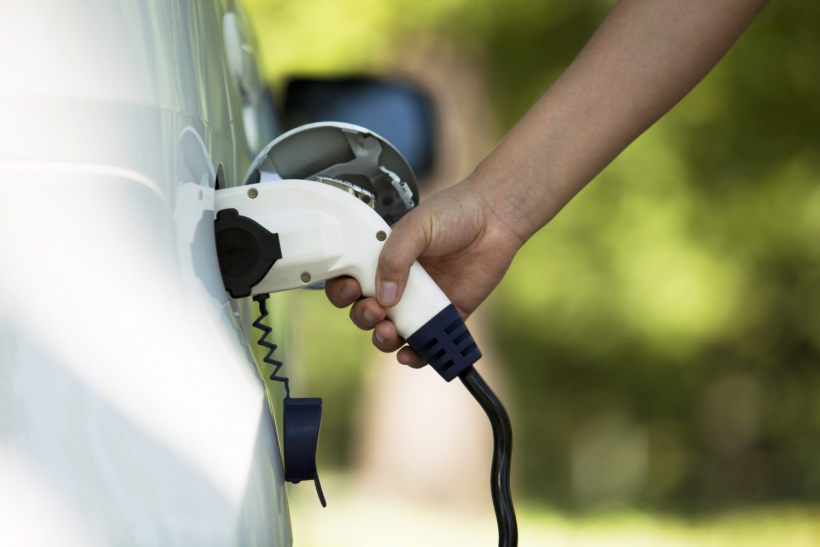Electric vehicles are the attractive, consumer-friendly face of the energy transition. They look like they came from the future and use new technology.
As Tesla first made it, the electric vehicle is now seen as sleeker, faster, and more stylish than traditional cars and trucks with internal combustion engines that burn dirty fossil fuels that are blamed for changing weather patterns and killing off species.
EVs are great for people who have money and those who care about the environment. They let the wealthy enjoy the time-honored pleasures of conspicuous consumption while saving the planet at the same time.

Stock image of a person charging an electric car. Sodium could offer an alternative to lithium-based electric car batteries.
Converting Gasoline Superusers to EV Users Soon a 'Need'
A study by the environmental group Coltura found that 10 percent of US drivers drive 30,000 miles or more a year and use about 32 percent of all gasoline. These drivers are members of the Gasoline Superusers Club. Coltura says that amount of gas use is more than the total gas use of the bottom 60% of American drivers.
Coltura says that if the U.S. wants to meet its decarbonization goals for 2030, it needs to get these superusers into EVs as soon as possible. Transportation is a significant source of greenhouse gas emissions. In the U.S., 27 percent of all GHG emissions come from transportation; the same is true in Europe. About 57% of these numbers come from passenger cars and light-duty trucks. One important way to reduce these emissions is to switch from ICE vehicles to EVs.
So, Coltura says that incentives should be given to the estimated 25 million people who use a lot of gasoline instead of providing incentives to everyone who buys an EV. Melvin Kranzberg, a historian of technology, has noticed in a JStor article that nontechnical factors are more important than technology when making policy decisions about technology, even though technology is a crucial part of many public issues.
For example, IEEE Spectrum said government policies and subsidies meant to encourage electric vehicles and discourage internal combustion engine vehicles must include the more than 260 million privately owned vehicles in the U.S. and, eventually, the other 1.2 billion vehicles owned around the world, both of which will keep growing. To meet the policy-driven need to replace ICEs with EVs, both established and new car companies need to make a lot more EVs quickly. Then there's the fact that hundreds of millions of people worldwide who drive ICE vehicles are willing to change their habits, lifestyles, and, for many of them, their jobs to cut down on greenhouse gas emissions.
ALSO READ: Dogs Prefer Electric Vehicles Over Diesel Cars as It Offers Smoother Ride That Calms Them Down
Rush to EV an Expensive Mistake?
But people who have thought more about how the world can stop being so dependent on oil and gas are worried about the rush to replace gas-guzzling cars with a new fleet of clean, quiet, battery-powered vehicles.
Many people, like John Lorinc, who won the 2022 Balsillie Prize for Public Policy last month for his book Dream States, are worried that the rush to go electric needs to be thought out better.
This could lead to costs that some people can't keep up with and damage to the environment that isn't necessary.
"It's [a significant] evolution of technology to get away from internal combustion engines, so that part is necessary," Lorinc told CBC Canada.
But he said that the change has many problems, such as the fact that fossil fuels are still used to make a lot of the world's electricity.
He said that electric cars are big pieces of engineering that need a lot of metal and a lot of parts that are shipped all over the world. He also said that a lot of mining and processing of minerals is needed to make the parts, so there are better solutions for the environment.
RELATED ARTICLE: 4 Reasons Why Electric Cars are Safer Than Gasoline- and Diesel-Powered Vehicles
Check out more news and information on Electric Cars in Science Times.


![Extinct Giant Salmon Had Tusk-Like Spikes Protruding Out of Its Snout That Can Easily Kill Shark, Other Large Marine Animals [Study]](https://1721181113.rsc.cdn77.org/data/thumbs/full/53304/89/56/50/40/extinct-giant-salmon-had-tusk-like-spikes-protruding-out-of-its-snout-that-can-easily-kill-shark-other-large-marine-animals-study.png)











